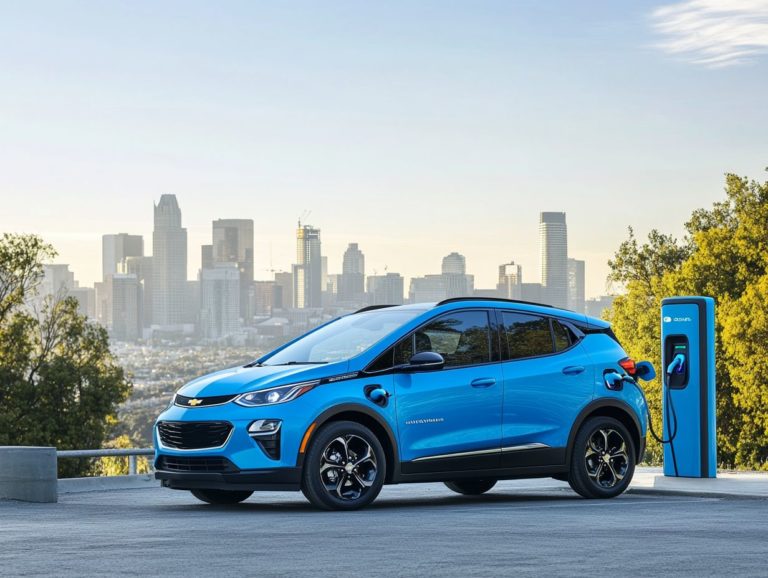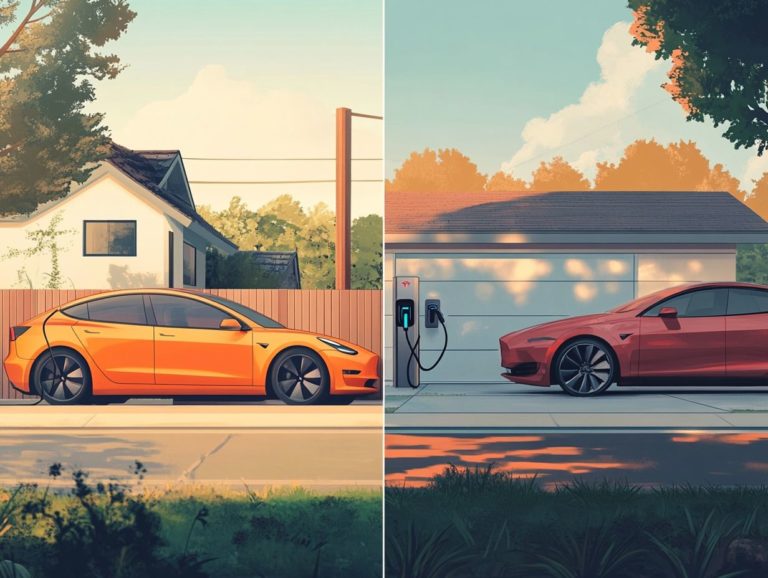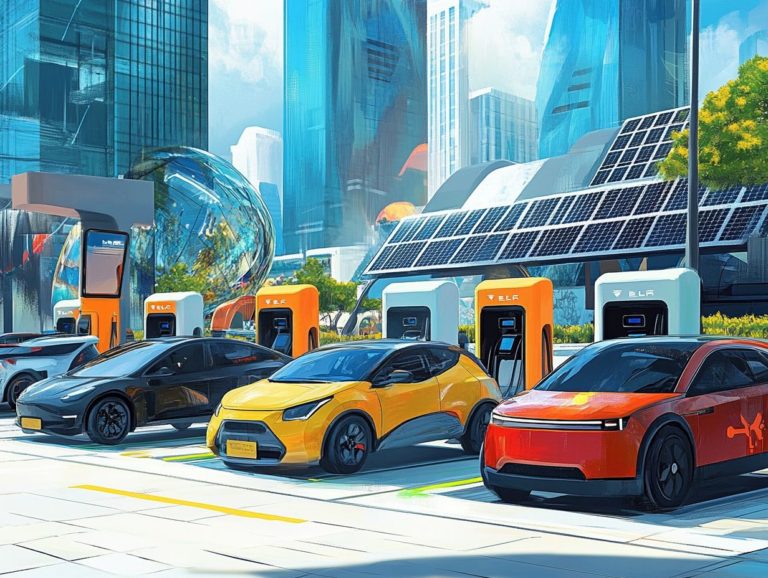5 Reasons to Switch to an Electric Vehicle Now
As the world transitions toward more sustainable practices, electric vehicles (EVs) are shaping up to be a savvy choice for both your wallet and the environment.
With fuel prices on the rise and heightened awareness of climate change, there s no better moment for you to consider making the switch.
Get ready to discover five amazing reasons to embrace electric, ranging from substantial savings on fuel costs to government incentives that lighten the financial load.
You will learn about the various types of EVs available, their standout features, common concerns, and the long-term benefits of adopting this innovative technology.
Join in as you explore the thrilling future of electric vehicles and what they mean for you and the planet.
Contents
- Key Takeaways:
- 1. Saves Money on Fuel Costs
- 2. Reduces Carbon Footprint
- 3. Low Maintenance Costs
- 4. Government Incentives and Tax Credits
- 5. Advancements in Technology
- What Are the Different Types of Electric Vehicles Available?
- Frequently Asked Questions
- What are the benefits of switching to an electric vehicle now?
- How much money can I save by switching to an electric vehicle?
- What impact do electric vehicles have on the environment?
- Are electric vehicles convenient to own?
- Do electric vehicles have a limited driving range?
- How can I charge my electric vehicle?
Key Takeaways:
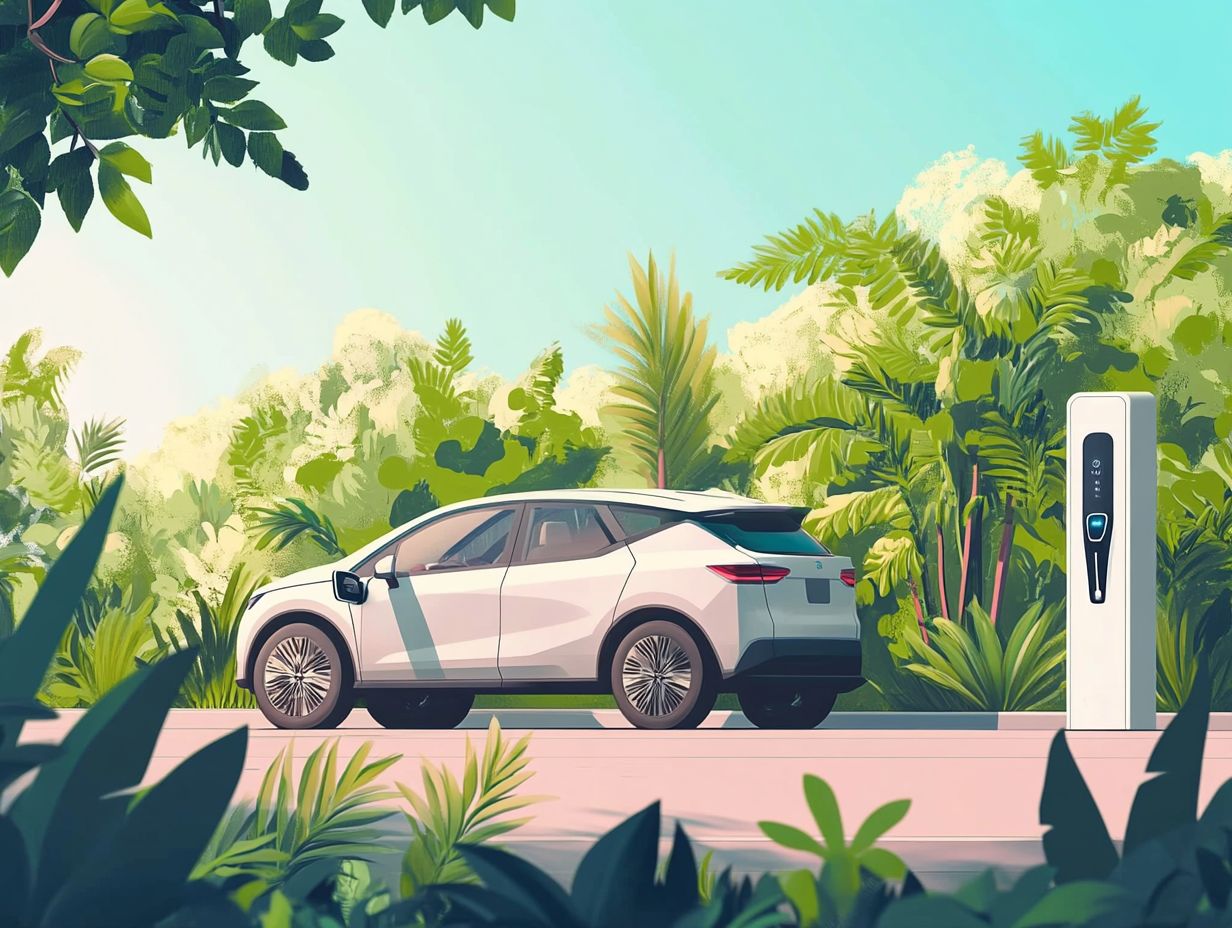
- Save money on fuel costs and reduce your carbon footprint by switching to an electric vehicle now.
- Government incentives and tax credits can make it even more affordable to make the switch.
- Electric vehicles have low maintenance costs and advancements in technology make them a reliable and sustainable option for the future.
1. Saves Money on Fuel Costs
Electric cars offer you a modern driving experience paired with impressive performance features. They significantly reduce your fuel costs compared to traditional gasoline vehicles.
By using rechargeable energy sources, electric vehicles (EVs) enable you to enjoy substantial savings on fuel expenditures. You can take advantage of government incentives and rebates that enhance these benefits even further.
The cost per mile for charging your electric vehicle is often dramatically lower than the price of gasoline. This translates into ongoing reductions in your overall transportation expenses.
Many regions offer tax credits or rebates that can significantly lower the initial purchase price of an electric vehicle. This makes your shift to greener technology even more wallet-friendly.
Over time, the combination of lower operational costs and potential government support adds up, leading to long-term savings that could leave thousands of dollars in your pocket. It truly makes a compelling case for making the switch to electric.
2. Reduces Carbon Footprint
One of the most compelling reasons for you to drive electric vehicles is their ability to significantly reduce your carbon footprint. Unlike traditional vehicles that contribute to environmental pollutants, electric vehicles produce zero tailpipe emissions.
This substantial reduction in harmful emissions is vital. Transportation is responsible for nearly 29% of total greenhouse gas emissions in the United States.
By making the switch to electric vehicles, you could help eliminate around 4.6 metric tons of carbon dioxide each year. This would drastically improve air quality in urban areas.
Electric vehicles also play a crucial role in advancing the transition to renewable energy sources (like wind and solar). With ongoing advancements in battery technology (the tech that powers electric vehicles) and infrastructure, the importance of electric vehicles in fostering a sustainable future becomes increasingly clear.
3. Low Maintenance Costs
Electric vehicles are celebrated for their remarkably low maintenance costs. They feature fewer moving parts and have less dependence on complex mechanics.
This design not only enhances vehicle safety but also improves energy efficiency over time. This translates into significant savings for you while also reducing downtime.
You ll find yourself spending more time on the road and less time in a repair shop. Unlike traditional internal combustion engine vehicles, electric vehicles free you from routine expenses like regular oil changes.
The braking system that helps save energy in electric vehicles minimizes brake wear. This extends the lifespan of brake components and reduces how often you need replacements.
The simplicity and efficiency of electric drivetrains contribute to their reliability. They re a wise choice for those looking to optimize transportation costs.
4. Government Incentives and Tax Credits
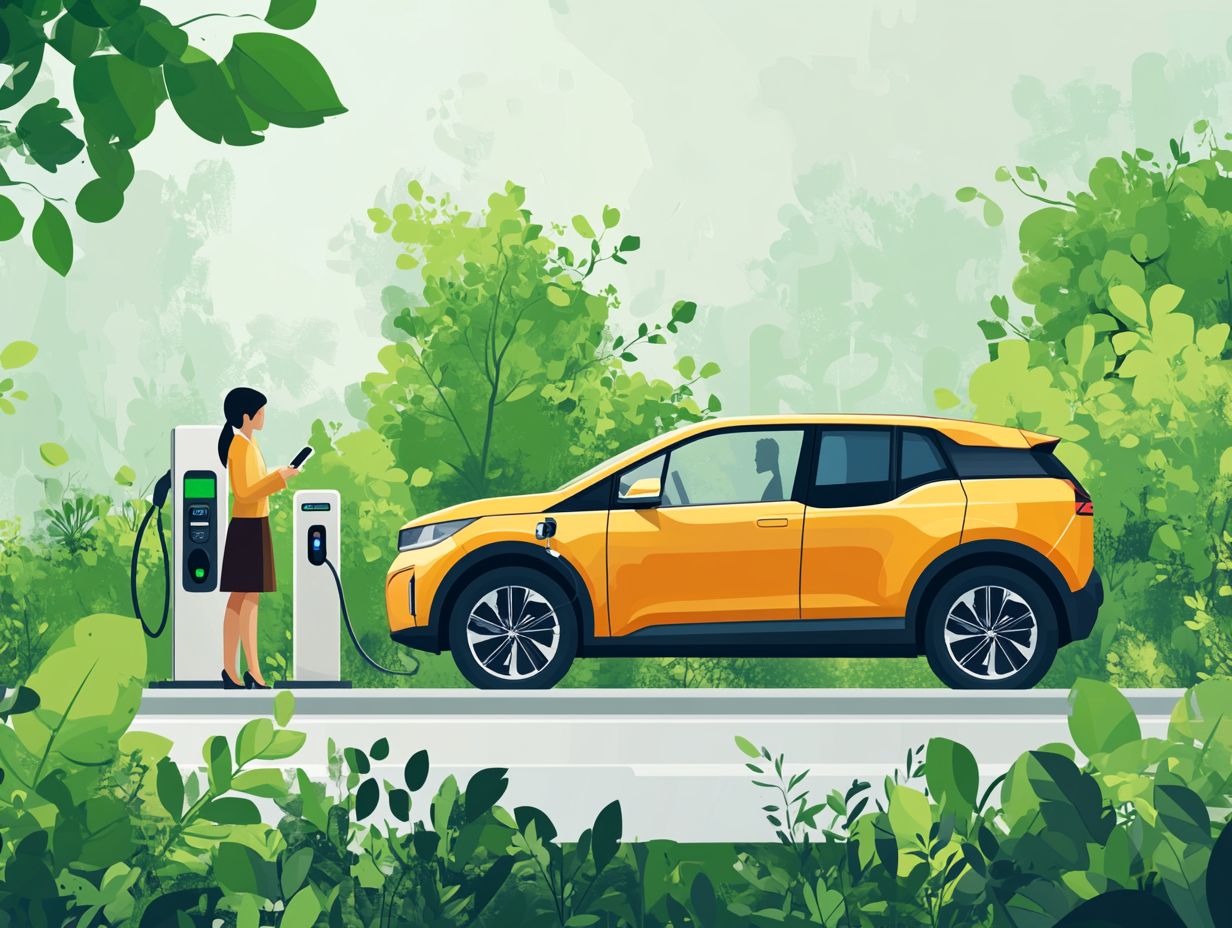
Government incentives and tax credits for electric vehicles, like Clean Vehicle Tax Credits and federal tax credits, make transitioning to electric cars more appealing and affordable.
These incentives help reduce the big initial costs of buying an electric vehicle, offering you much-needed financial relief. At the federal level, you could receive tax credits worth several thousand dollars, depending on your vehicle’s battery capacity.
Many states provide additional rebates and tax incentives for electric vehicle owners, further lowering your overall purchase price.
- For instance, California has a Clean Vehicle Rebate Project that can give you up to $7,000 if you qualify.
- Similarly, New York offers a program that grants up to $2,000.
To benefit from these programs, you usually need to meet certain criteria, like income limits or residency requirements. Your vehicle must also meet specific emissions standards to qualify.
5. Advancements in Technology
Electric vehicles are now better than ever thanks to advancements in technology. Innovations in battery capacity, charging stations, and performance features enhance your driving experience and access to clean energy solutions.
These exciting new batteries let you travel further, allowing you to go longer distances without frequent recharging. Fast-charging networks mean you can conveniently power up your vehicle in less time, making electric car ownership more practical.
Smart features, like integrated navigation systems that optimize charging stops and advanced driver-assistance systems, make electric cars user-friendly and safer on the road. As these technologies continue to develop, more people are drawn to electric vehicles for their sustainable choices.
What Are the Different Types of Electric Vehicles Available?
The electric vehicle market has evolved impressively, offering options like battery electric vehicles (BEVs), plug-in hybrid vehicles (PHEVs), and hydrogen fuel cell vehicles. Each type has special qualities to meet diverse consumer needs.
Battery electric vehicles run solely on electricity stored in batteries. They are perfect for those who want zero emissions and lower running costs, making them ideal for city driving. Plug-in hybrids offer a flexible alternative, allowing you to switch between electric and gasoline power for longer trips while keeping emissions in check.
Hydrogen fuel cell vehicles generate electricity through a chemical reaction between hydrogen and oxygen. They provide quick refueling and extended ranges, making them a great choice for those who prioritize efficiency and sustainability. Exploring each type helps you find the electric vehicle that best suits your lifestyle.
What Are the Key Features and Benefits of Electric Vehicles?
Electric vehicles come packed with impressive features, including advanced performance and better energy use. These characteristics enhance your driving experience and offer significant environmental benefits.
One standout feature is their instant torque, which provides quick acceleration for a more engaging and thrilling ride something many drivers appreciate.
Regenerative braking is vital for energy conservation. This system helps recharge the battery when the car slows down, maximizing efficiency and extending battery life.
The quiet operation of electric vehicles creates a peaceful driving experience while reducing noise pollution, positively impacting urban environments.
These innovative features not only enhance your driving pleasure but also contribute to a cleaner, more sustainable future.
What Are the Most Common Concerns About Electric Vehicles?
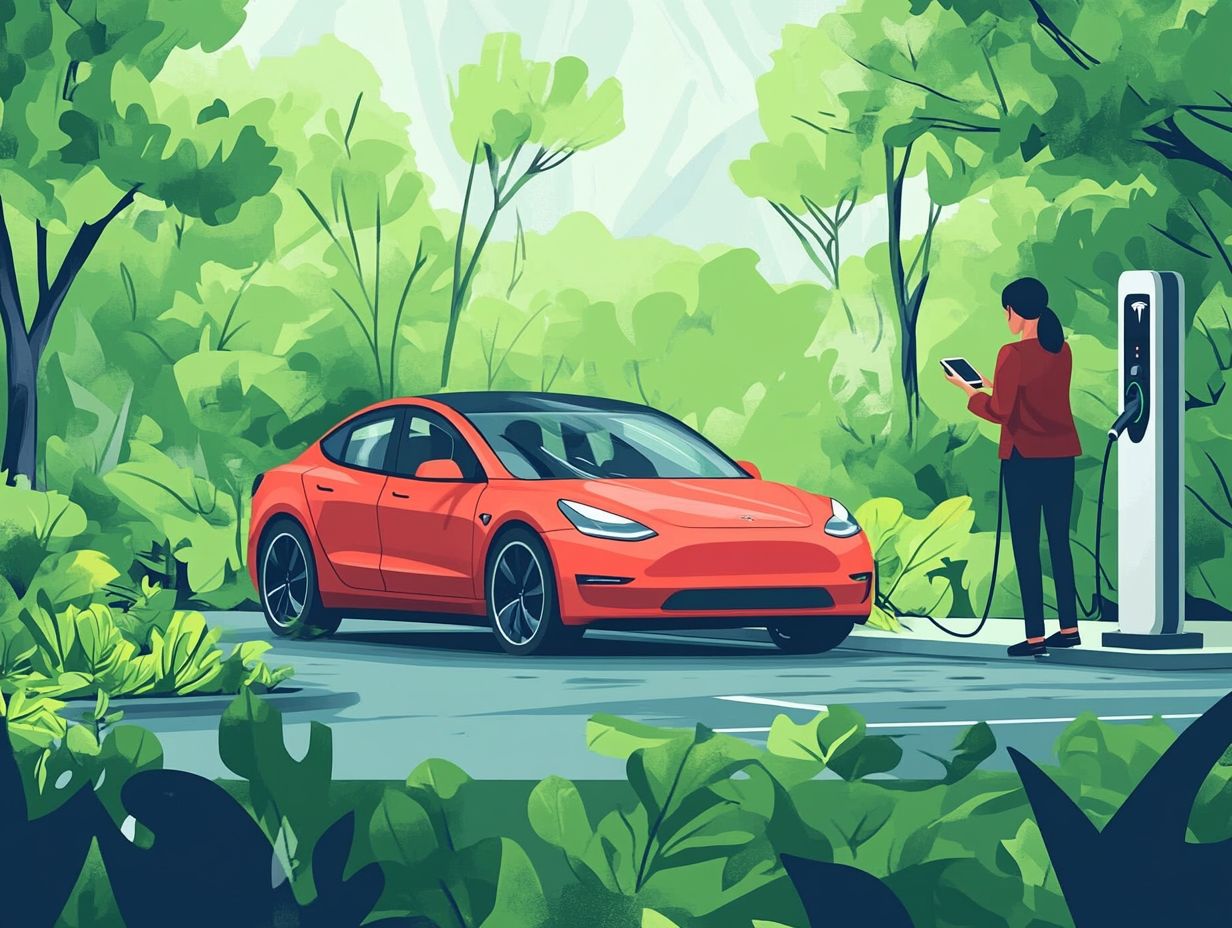
Electric vehicles are becoming more popular, but some concerns remain. These include charging station availability, maintenance costs, and performance features.
These worries often stem from misconceptions about the infrastructure necessary to support electric mobility. In reality, recent reports indicate that there are over 100,000 charging stations across the United States, making it remarkably convenient for you to find a place to recharge.
Advancements in battery technology have dramatically enhanced range. Many modern electric vehicles now offer over 200 miles on a single charge, easing any range anxiety the fear that your vehicle may run out of charge before reaching your destination. Zero-emission electric cars offer impressive acceleration and performance, allowing them to compete with traditional gasoline vehicles.
Imagine enjoying an exhilarating driving experience while helping the planet!
How Can Electric Vehicles Help with Environmental Sustainability?
Electric vehicles play a pivotal role in promoting environmental sustainability by achieving zero tailpipe emissions and harnessing clean energy sources. They are essential in the battle against climate change.
By significantly reducing greenhouse gas emissions compared to traditional gasoline-powered cars, you can help mitigate the harmful effects of global warming. When you drive an electric vehicle powered by electricity sourced from renewables like solar, wind, or hydropower, you’re further lessening dependence on fossil fuels, contributing to a cleaner energy landscape.
This transition not only shrinks your carbon footprint but also aligns with broader environmental objectives, such as enhancing air quality. As more individuals embrace this shift, the combined impact paves the way for a more sustainable future.
What Are the Long-Term Savings of Switching to an Electric Vehicle?
Switching to an electric vehicle can lead to significant long-term savings. This is especially true when you factor in lower maintenance costs and reduced fuel expenses.
These advantages greatly diminish your total cost of ownership over time, allowing you to spend considerably less on routine upkeep and fuel. Many regions offer attractive subsidies that enhance the financial appeal, making that initial purchase more manageable.
By taking advantage of these incentives, you may find that transitioning to an electric vehicle aligns with your environmental values. It also proves to be a wise financial move, freeing up resources for other investments in your personal finance journey.
What Does the Future Hold for Electric Vehicles?
As technology advances and reshapes the automotive landscape, the future of electric vehicles is poised for remarkable growth. Major consumer reports highlight a burgeoning market share, driven by your demand for sustainability and efficiency.
The surge in electric vehicle options is clearly illustrated by rising sales forecasts. Analysts anticipate millions of units sold annually over the next decade. As charging technology undergoes rapid evolution, initiatives focused on enhancing the efficiency and speed of charging stations are becoming more prominent, effectively tackling one of the key obstacles to widespread adoption.
Your shifting preferences reveal a strong desire for eco-friendly alternatives. This has prompted manufacturers to roll out innovative features that cater to your environmentally conscious values. This collective movement is shaping a cleaner, more sustainable automotive future, one electric vehicle at a time.
Frequently Asked Questions
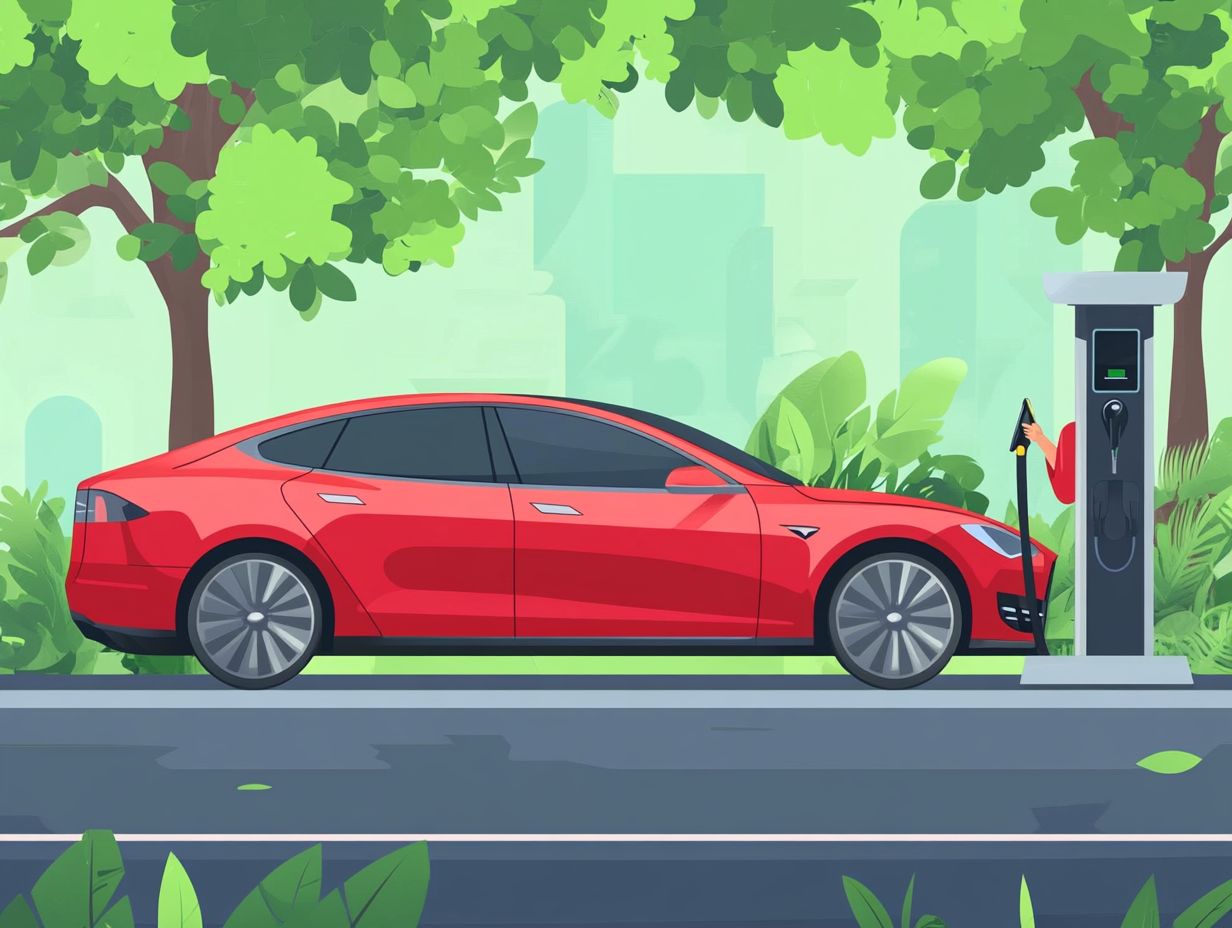
What are the benefits of switching to an electric vehicle now?
Switching to an electric vehicle offers fantastic benefits, including:
- Cost savings
- Positive environmental impact
- Convenience
How much money can I save by switching to an electric vehicle?
Your savings from switching to an electric vehicle depend on your current car and driving style. On average, you can save hundreds of dollars each year on fuel costs.
What impact do electric vehicles have on the environment?
Electric vehicles produce zero emissions. This makes them much less harmful to the environment than traditional gasoline cars.
Are electric vehicles convenient to own?
Yes, owning an electric vehicle is becoming easier. More charging stations are available, and maintenance costs are usually lower, thanks to fewer moving parts.
Do electric vehicles have a limited driving range?
While older models had shorter ranges, newer electric vehicles can travel over 200 miles on a single charge. This means you can enjoy long road trips without frequent charging stops.
How can I charge my electric vehicle?
You can charge your electric vehicle at home using a regular outlet or by installing a dedicated charging station. Public charging stations are also widely available at shopping centers and along major highways.

